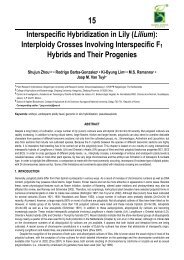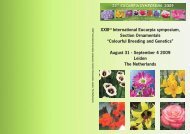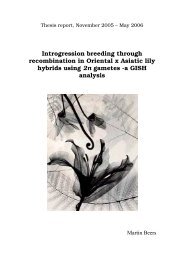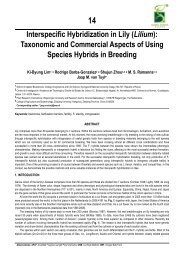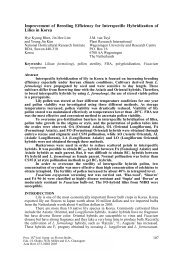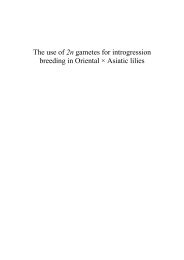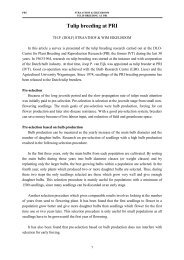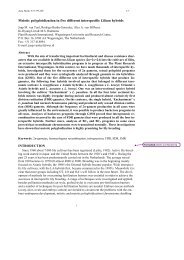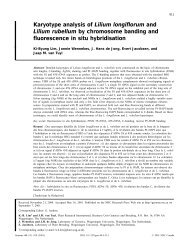A molecular cytogenetic analysis of chromosome behavior in Lilium ...
A molecular cytogenetic analysis of chromosome behavior in Lilium ...
A molecular cytogenetic analysis of chromosome behavior in Lilium ...
Create successful ePaper yourself
Turn your PDF publications into a flip-book with our unique Google optimized e-Paper software.
Chapter 2AbstractTwo types <strong>of</strong> newly <strong>in</strong>duced polyploids (neopolyploids) <strong>of</strong> <strong>Lilium</strong> hybrids were monitored forthe occurrence <strong>of</strong> chromosomal rearrangements through Genomic <strong>in</strong> situ Hybridization (GISH)technique. One <strong>of</strong> the populations was obta<strong>in</strong>ed through cross<strong>in</strong>g an allotriploid Longiflorum× Oriental hybrid (LLO) and an allotetraploid Longiflorum × Trumpet hybrid (LLTT) both <strong>of</strong>which were derived from somatic <strong>chromosome</strong> doubl<strong>in</strong>g. The other type <strong>of</strong> allopolyploidpopulation was derived from meiotic <strong>chromosome</strong> doubl<strong>in</strong>g <strong>in</strong> which numerically unreduced(2n) gametes from two different <strong>in</strong>terspecific hybrids, viz., Longiflorum × Asiatic (LA) andOriental × Asiatic (OA), were used to get backcross (BC) progeny with the Asiatic parents.GISH clearly discrim<strong>in</strong>ated the three constituent genomes (L, T and O) <strong>in</strong> the complements <strong>of</strong>the progeny obta<strong>in</strong>ed from mitotic <strong>chromosome</strong> doubl<strong>in</strong>g. A total <strong>of</strong> 26 genotypes wereanalyzed from this population and there was no evidence for any chromosomalrearrangements. However, <strong>in</strong> the case <strong>of</strong> meiotically doubled allopolyploid progenyconsiderable frequencies <strong>of</strong> chromosomal rearrangements were observed through GISH. Theso-called chromosomal rearrangements <strong>in</strong> meiotic polyploids are the result <strong>of</strong> homoeologousrecomb<strong>in</strong>ation rather than “translocations”. Evidence for the occurrence <strong>of</strong> meioticrecomb<strong>in</strong>ation <strong>in</strong> the LA hybrids has been confirmed with GISH on meiotic <strong>chromosome</strong>s.Thus, there was evidence that neopolyploids <strong>of</strong> <strong>Lilium</strong> hybrids did not possess any noticeable<strong>chromosome</strong> rearrangements.Keywords: <strong>Lilium</strong>; polyploids; genomic <strong>in</strong> situ hybridization (GISH); homoeologousrecomb<strong>in</strong>ation16



